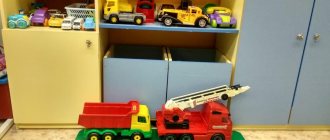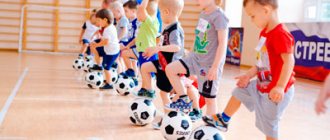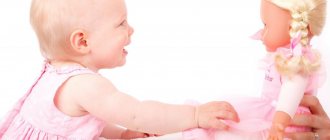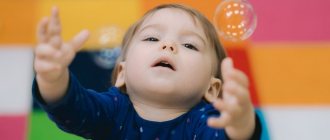Early childhood psychological service (using the example of preschool educational institution No. 47) 1611
Early age is that crucial period of a person’s life when the most fundamental abilities that determine the further development of a person are formed. During this period, such key qualities as cognitive activity, trust in the world, self-confidence, a friendly attitude towards people, creative opportunities, general life activity and much more are formed. However, these qualities and abilities do not arise automatically as a result of physiological maturation. Their formation requires adequate influence from adults, certain forms of communication and joint activities with the child. The origins of many of the problems that parents and teachers face (reduced cognitive activity, communication disorders, isolation and increased shyness or, on the contrary, aggressiveness and hyperactivity of children, etc.) lie precisely in early childhood. Correction and compensation of these deformations in preschool and school age present significant difficulties and require significantly more effort and costs than their prevention.
Currently, the vast majority of children spend their early childhood in the family. Family education is indeed optimal for a small child, since the love of close adults, their sensitive and flexible attitude, and individual communication are necessary conditions for the normal development of the child and his good emotional well-being. However, not all parents understand the age characteristics of children under 3 years old and know how to find adequate pedagogical influences. Most families retain the idea of early age as a period of physiological maturation and physical development. It is believed that mental development begins after 3 years. As a result, parents' attention is focused on the baby's physical health, limited to hygienic care (feeding, walking, bathing, etc.) and providing him with a lot of toys. In other families, on the contrary, they overestimate the child’s capabilities and begin to teach and raise a 2-year-old child in the same way as a 5-7 year old child (they teach him to read and write, use a computer, sit him in front of the TV, etc.). In both cases, the age characteristics of children are ignored, which can lead to very sad consequences. The result of this “inability” of parents is an increase in alarming problems associated with the mental health and development of children (delays in mental and speech development, lack of imagination, attention deficit, impulsiveness and aggressiveness, emotional deafness, etc.).
The full development of a young child requires adequate and qualified psychological and pedagogical support from professionals with the necessary qualifications. However, at present there is an acute shortage of relevant specialists (psychologists and teachers) to work with young children. In pedagogical universities in our country there is generally no such specialization - educational psychologist or early childhood educator. Nursery groups are staffed by preschool education specialists or those who do not have special education (medical staff, parents or relatives of children, etc.). As a result, young children (1–3 years old) are either left without any psychological and pedagogical support at all (the work of the teacher is limited to hygiene maintenance and adherence to the daily routine), or receive influences that do not correspond to their age characteristics.
Meanwhile, this age stage has significant qualitative specifics. It is impossible to apply to him methods and techniques of work suitable for raising preschoolers. Working with young children requires special training, involving both specialized knowledge and experience working with young children. All this makes it extremely important to create a psychological service for children under 3 years of age.
This task is of particular relevance at the present time, when there is an intense influx of young children into kindergartens. In recent decades, after mothers gained the opportunity to raise children under 3 years of age at home without losing their jobs and receiving child care benefits, the nursery system has virtually collapsed. Teachers who have experience working with children under 3 years of age have either retrained to work with preschoolers or left the education system. However, currently there is a reverse process: due to the changed socio-economic situation, more and more young mothers are forced to send their young children to nurseries. In Moscow kindergartens there are already quite a lot of children no older than 3 years old, there is a queue for nursery groups, and in the future, due to the increase in the birth rate in Moscow, the problem of raising young children in preschool educational institutions will become even more acute. It is obvious that this contingent, new to the capital’s education system, is in dire need of qualified specialists who can work with young children. In this regard, there is an urgent need to develop models of early childhood psychological services.
Psychological work with children under 3 years of age is a relatively young and not yet well-formed area of practical psychology. Today, it is extremely relevant to analyze the experience of the (still small) state educational institution No. 47. This kindergarten specializes in educating young children (from 1 to 3 years old) and is one of the base sites for the experiment in the Central District of Moscow, in which various forms of psychological and pedagogical work with young children are tested. In addition, Preschool Educational Institution No. 47 is part of the university district of Moscow State University of Psychology and Education: university employees provide scientific leadership of the psychological service, and university graduates (the authors of this article) work there as practical psychologists. In this article we are trying to generalize this experience and talk about the specifics and tasks of a psychologist’s work with this rather unique group of children.
The specifics of a psychologist's work
with children under 3 years old
It is obvious that the work of a psychologist involves, first of all, focusing on the age characteristics of children and understanding the difficulties that educators face. Let us dwell on the main problems in working with young children.
The first difficulty that both parents and kindergarten teachers face is the problem of adaptation to the child care institution .
. More than half of children aged 1 to 3 years are not ready for kindergarten. The lack of psychological readiness for a child care institution is fraught with numerous medical and psychological difficulties - children begin to constantly get sick, cry all day long, they experience neurotic reactions, aggravate psychosomatic phenomena, etc. However, there is currently no special work to prepare young children for a child care institution not being carried out. If the preparation of a child for school is repeatedly and carefully worked out and is one of the main tasks of education, then the transition of a child from a family to a child care institution, which turns out to be no less abrupt and traumatic event, remains unattended by teachers and psychologists. It is obvious that this problem needs to be given special attention.
One of the organizational forms of child adaptation to a child care institution is short-term stay groups, or “adaptation” groups.
At preschool educational institution No. 47, two such groups regularly work - in the first and second half of the day. The main tasks of these groups are as follows:
- overcome the symbiotic relationship between the child and the mother and promote the development of his independence and autonomy;
- attract children's attention to their peers and teach them to focus on the actions of their partners;
- establish humane, friendly relationships between children;
- offer children and parents educational games and activities appropriate to the children’s age;
- promote the development of children’s cognitive processes (attention, memory, thinking);
- enrich the lives of children with new impressions and positive emotions;
- prepare children for entering kindergarten.
These tasks are solved in the process of conducting a variety of games and activities, which are organized jointly by teachers and psychologists. The duration of each lesson is 3 hours. The number of group members is 8–10 children each. Parents take part in the first classes. Then, as the children adapt to the new environment, parents leave the children and go about their own business. The experience of conducting classes in a short-term group shows that the positive effect of these groups requires the participation of a psychologist.
The special task of the psychological service in adaptation groups is to work with difficult cases and find an adequate approach to different groups of children. The complexity of this task is that it is impossible to offer a single adaptation method for everyone - each child needs a special approach. The only common point is gaining the trust and affection of the baby. Without such trust in the new adult, the child’s normal emotional well-being is impossible.
The need for an individual teacher approach to each child is obvious at all ages. However, at an early age, an individual approach is crucial not only because all children are different, but also because a small child can only perceive the influence of an adult that is addressed personally
to him. Kids do not perceive calls or proposals addressed to the whole group. They need a look in the eyes, calling by name, a gentle touch, in a word, everything that indicates the personal attention and personal attention of an adult. Only in this case can they accept and understand the adult’s suggestions.
Another feature of working with young children is the ineffectiveness of purely verbal methods of influence.
Any instructions, explanations of the rules, calls for obedience turn out to be useless, since children still do not understand them well, and besides, until the age of 3-4, children cannot regulate their behavior through words. They live only in the present, and the influences of the situation (surrounding objects, movements, sounds) are much stronger motivators for them than the words of an adult. This feature of young children places high demands on the actions of the teacher and psychologist. They must be extremely expressive, emotional and “infectious”. Only your own enthusiasm for any activity can arouse interest in it in a small child. The teacher should have increased sensitivity to the baby’s conditions, expressive movements and facial expressions. This does not mean that you should not talk to young children. But words must be included in the context of real actions, have a bright intonation coloring, and be accompanied by appropriate gestures and movements.
From the above it follows that organized frontal lessons cannot be carried out with young children, when an adult explains or shows something, and the children “learn.” Such activities are not only ineffective, but also harmful, since they can paralyze the activity of children. of this age is to stimulate activity
every child, to arouse in him
the desire
to act, communicate, play, and solve practical problems. What is needed here is the emotional involvement of children, the creation of a common semantic field, and the emotional involvement of an adult in the necessary actions. This is the only way to convey to the child interest in a new activity, to attract and captivate him and thus arouse his own desire. All this places special demands on specialists working with young children. Emotional expressiveness, artistry, the ability to win over and convey interest in an activity are the professional qualities of specialists working with young children. These qualities are necessary for both teachers and psychologists.
It should be emphasized that psychologists and teachers should work especially closely with children under 3 years of age. At an early age, when the basic mental processes are just being formed, correctional work (unlike preschool and school age) is not the main thing for a practical psychologist. It is much more important at this stage to create adequate conditions for the full development of age-related neoplasms. This task is common to a teacher and a psychologist, but if a teacher focuses on a certain program and the child’s achievements, the psychologist focuses on the age and individual characteristics of children, their independent activity and emotional comfort. It is obvious that these lines complement each other; in addition, they are implemented on a common content and are aimed at the general tasks of the child’s development.
young
children In relation to an early age, there are specific and specific developmental tasks, which become the content of the work of both a psychologist and a teacher. Let's look at them in more detail.
First of all, this is the development of objective activity, since this activity is leading at an early age. It is in it that the child is introduced to culture, in it the main psychological new formations of this period are formed: speech, visual-effective and figurative thinking, cognitive activity, purposefulness, etc. Within the framework of objective activity, several directions can be distinguished, each of which is an independent task and involves certain methods of implementation.
Firstly, this is the development of culturally normalized, specific and instrumental actions. A small child must learn to use the objects around him: eat correctly with a spoon, draw with a pencil, dig with a shovel, comb his hair with a comb, fasten buttons, etc. All this is necessary not only for the development of hand movements and general motor skills, but also for overcoming spontaneous, impulsive activity, and therefore, to master oneself and one’s behavior. The child must understand and assign the meaning of these simple actions, see their result, and feel his skill. This is how he gains a sense of his competence, independence, and self-confidence. To solve this problem, it is necessary to accustom him to self-care from the first year of his life: show him how to dress properly, comb his hair, hold a spoon or cup, leaving him the opportunity to act independently and encouraging him to do so. In addition to ordinary household procedures, we need special toys created for young children (scoops, spatulas, fishing rods with a magnet, etc.).
Another line of objective activity is the development of visual and effective thinking and cognitive activity. A young child thinks primarily using his hands. By correlating the shape or size of individual objects, he connects the properties of objects and learns to perceive their physical qualities. For such activities, there are numerous toys specifically designed for children. These are all kinds of inserts of various shapes, pyramids, simple nesting dolls, turrets, etc. By guiding balls through a maze or trying to open mysterious boxes in which the desired prize is hidden, the baby solves real mental problems. And although solving these problems is inseparable from practical actions, it requires significant mental effort and cognitive activity. The adult’s task here is not to show the correct method of action (i.e., to suggest a solution to the problem), but to evoke and support cognitive activity, to interest the child in a mysterious object and to encourage independent experimentation.
Another important direction in the development of objective activity is the formation of purposefulness
and perseverance of the child’s actions
. It is known that the activities of a child under 2 years of age are procedural in nature: the baby receives pleasure from the process of action itself, their result does not yet have any independent meaning. By the age of 3, the child has a definite idea of the result of what he wants to do, and this idea begins to motivate the child’s actions. A child at this age no longer acts just like that, but with the goal of obtaining a certain result. Thus, the activity becomes purposeful. It is obvious that focus on results and persistence in achieving goals are the most important characteristics not only of a child’s activities, but also of his personality as a whole. To develop this valuable quality, the help of an adult is necessary. A small child needs to be helped to “hold” the goal, directed towards achieving the desired result.
To do this, you can use constructive games and toys that involve obtaining a specific product. These can be shaped pyramids from which you need to assemble an object (a car, a soldier, a dog, etc.), all possible mosaics or puzzles that are used to create pictures, cubes or simple construction sets for small children. All of these games require an idea of what should happen and persistence in achieving the result.
All of the listed types of objective actions require individual work by the child. Small children do not yet know how to act together; objects and actions with them completely absorb the interests of children; at the same time, they cannot focus on the actions of their partner, take into account other people’s desires, etc. Each child should have his own toy in his hands and his own ways of acting with it. Such individual activity with objects causes concentration and concentration on the object, a kind of “fascination” with one’s actions. This is a very important and valuable condition. Montessori saw the beginning of the child's will in the concentration of children on actions with objects. It is necessary to support the child’s individual work with objects in every possible way and create the necessary conditions for it. This, in turn, requires a sufficient number of adequate benefits and a special organization of the development environment. Consulting educators on the selection of the right toys, creating a playful developmental environment, and periodically updating it - all these are the tasks of a psychologist who must focus on the interests and capabilities of children of this age.
Another extremely important and responsible task in raising young children is the development of speech.
. Speech acquisition, as is known, mainly occurs during this period - from one to three years. Speech rebuilds all the child’s mental processes: perception, thinking, memory, feelings, desires. It opens up opportunities for completely new and specifically human forms of external and internal life - consciousness, imagination, planning, managing one’s behavior, logical and figurative thinking and, of course, new forms of communication.
Speech in a young child arises and initially functions in the process of communication with an adult. The first task of education in this regard is the development of active, communicative speech. To do this, it is necessary not only to constantly talk with the child, but also to include him in the dialogue, to create in him the need for his own statements. A child’s speech does not develop through imitation of other people’s models, even the most correct ones. For a child to speak, he must have a need for it, a need to express in words what cannot be expressed by other means. Such a speech task (the task of pronouncing the right word) is given to the child by an adult.
At the first stages of development, the baby’s speech is included in his practical objective actions and is inseparable from them. A child can only talk about what he sees and what he does here and now. Therefore, the inclusion of words in specific actions (or “unity of word and deed”) is an important principle for the formation of active speech. Each new word should be understandable to the child, carry a certain meaning and be based on a specific situation. Creating such a speech-generating situation that activates children’s speech is a special psychological and pedagogical task that should be solved jointly by a teacher and a psychologist.
The second important line of speech development is the improvement of so-called passive speech
, i.e. understanding the speech of an adult. Most children at 1.5–2 years old already understand well all words and simple phrases if they are included in a specific situation. Overcoming situational coherence and the formation of the grammatical structure of speech is the most important line of development at an early age. Literature plays an invaluable role in this. Short and simple children's fairy tales, poems by A. Barto or S. Marshak, folk nursery rhymes and songs provide the necessary material for speech development. However, adults must open this material to children and make it understandable and attractive. This is helped by expressive reading, accompanied by gestures, bright intonations and, possibly, a puppet show. The development of methods for the speech development of young children is also the task of a psychologist.
At an early age, another important function of speech arises - regulatory
. The ability to control your behavior with words appears. If up to 2 years of age the child’s actions are determined mainly by the perceived situation, then in the second half of early childhood it becomes possible to regulate the child’s behavior through speech, when the child follows the adult’s speech instructions. Psychologists consider this form of behavior as the first stage in the development of voluntary behavior, when the child’s actions are mediated by a speech sign. Therefore, acting according to instructions opens up the possibility of developing self-regulation and self-control. This essential ability must be developed and exercised. It is important to choose for each child a certain level of complexity of instructions that corresponds to his capabilities and abilities. This is a very significant line of child development at an early age, which requires appropriate psychological and pedagogical support.
Mastering speech at an early age makes possible the development of children's imagination. Imagination arises in the third year of life, when the ability for playful substitutions appears, when familiar objects are given new names and begin to be used in a new capacity. Such play substitutions are the first form of the child’s imagination and constitute the most important step towards the child’s new leading activity – role-playing play. Numerous observations and studies show that play does not arise on its own, without the participation of those who already know how to play - adults or older children. A small child needs to be taught to play. Learning to play is carried out not in class, but in the process of playing together with an adult, who teaches the child how to replace some objects with others. The play of children requires the indispensable participation of an adult, who not only conveys to them the necessary methods of play actions, but also “infects” them with interest in the activity, stimulates and supports their activity. Any game has a complex educational effect: it requires mental, volitional, and physical effort, coordination of one’s actions and, of course (if the child is truly involved in it), brings emotional satisfaction. Therefore, the development of creative play and imagination in children 2–3 years old is the most important task of a psychologist.
At an early age, another extremely important area of a child’s life arises – his communication and relationships with peers. Despite the fact that the need for a peer is far from taking the main place in early childhood and is usually not considered as the main line of its development, the first forms of interaction between children play an extremely important role in the development of the child’s personality and interpersonal relationships. It is here that a sense of immediate community and connection with other people equal to the child is established. Research shows that the need to communicate with peers arises in the third year of life. At this age, children’s communication has a very specific content, which is an emotional-practical interaction. A special place in such interaction is occupied by imitation of each other. Children seem to infect each other with common movements and emotions and through this they feel mutual community. Such interaction gives the child a feeling of similarity with another, equal being. The experience of similarity and community causes intense joy and promotes self-awareness. The teacher can give it a cultural, organized form. The optimal means for this are well-known games in which children act simultaneously and in the same way: “Loaf”, “Carousel”, “Blow up, Bubble”, “Bunny”, etc. These games at an early age should take place with the direct participation of an adult who organizes children, shows them the necessary movements and words, immerses them in the general atmosphere of the game. The development, selection and conduct of such games constitute an important area of work for a psychologist.
Almost all young children (from 1.5 years old) growing up in a family need contact with peers and mastering communication skills. Early childhood is a sensitive period for developing a tolerant attitude towards others. Therefore, it is advisable to combine children with different difficulties in one group. At preschool educational institution No. 47 there are two integrative groups that are attended by several children with Down syndrome. Bringing together different children at an early age is very effective. For children with special needs, this makes it easier to adapt to the society of their peers and accelerates their development, and for ordinary children it gives irreplaceable experience of communicating with others who are different from them, which is extremely important for developing tolerance. At the same time, the correct organization of communication between children in an integrative group presents serious difficulties and requires the participation of professional psychologists.
All of these tasks are common to the teacher and psychologist and are solved in their close cooperation. A practical psychologist in a nursery group has his own specific functions. This is primarily psychological diagnostics and work with parents. Let us dwell on them in more detail and tell you how these areas are implemented in preschool educational institution No. 47.
Peculiarities of psychological
diagnostics of young children
Practice shows that recently various forms of mental development disorders have become increasingly common in children. Children with special needs make up a large part of the child population. Healthy children also often experience delays in speech development, emotional disturbances, impulsivity, disinhibition, etc. Timely identification of these problems is crucial for overcoming them and building an adequate strategy for working with the child. The most important task of the psychological service is to monitor the mental development of young children
. It is known that in the first 2–3 years of life, a child’s development occurs extremely intensively; in fact, every 2–3 months new abilities and capabilities of the baby are discovered. Delays or deviations in development at this age are fraught with serious problems in later periods. However, specialists, as a rule, do not monitor the normal mental development of children. If the medical examination procedure for young children is carried out regularly, then their mental development remains unattended by professionals. Filling this serious gap is one of the important tasks of psychological services.
However, diagnosing the development of young children has significant specifics and requires a special approach. Our kindergarten uses a new version of psychological diagnostics [3].
The novelty of this diagnosis lies in the fact that for the first time it is based on areas fundamental for the mental and personal development of children - communication with adults and objective activity. This approach allows you to take a fresh look at the child, evaluate his achievements along the main lines of his development, which ensure the formation of such basic personal qualities as initiative, curiosity, creativity in relationships with the social and objective world, trust in him and self-confidence. At the same time, the importance of the development of motor skills, sensory sphere, speech and other mental functions is not denied, but they are considered as means of communication and objective activity, and not as the main tasks of education.
The fact of an adult’s influence on the full development of a child has recently been established and generally accepted. The formation of almost all abilities is carried out in his interaction with adults and depends on the content of communication. However, in practice, diagnostic procedures, as a rule, involve assessing children’s compliance with individual instructions and isolated actions and practically do not include tests aimed at identifying the nature of the child’s communication with adults. This diagnostic option fills this significant gap. Based on many years of scientific research, the authors developed qualitative and quantitative criteria for assessing the main forms of communication between a young child and adults. The specificity of this communication lies in the fact that it unfolds against the background of actions with objects and includes them as its content. This determines the diagnostic procedure, which is based on the diagnostician’s simultaneous observation of how the child communicates with an adult (including through speech) and how his objective activity proceeds. Thus, diagnostics is carried out in several directions at once, the main of which are the following:
- diagnostics of the development of communication with adults, including identifying the development of speech as a means of communication;
- diagnostics of the level of development of objective activity leading at an early age (motor abilities and level of cognitive activity are considered as aspects of objective activity).
A comprehensive qualitative analysis allows not only to diagnose the current level of development of individual areas, but also to establish the causes of certain lags in development. A distinctive feature of the methods that determine the level of development of a child’s activity is his involvement in communication with an adult. Based on the concept of the zone of proximal development, we proceed from the fact that in order to determine the actual level of development of a child, it is not enough just to measure and record his current actions; it is necessary to detect and take into account his potential capabilities that arise and manifest themselves in joint activities with an adult. The degree to which an adult accepts help and support and the ability of an adult to influence a child’s independent actions are the most important indicators of the child’s potential.
However, diagnostics is far from the main direction of a psychologist’s work. As already noted, it is much more important to provide adequate conditions for the normal development of the child’s psyche and personality. The main thing among these conditions is the child’s full and age-appropriate communication with close adults.
Psychologist's work with parents
The central and determining figures in the upbringing and development of a child are, naturally, parents. The task of increasing the psychological and pedagogical awareness of parents is closely related to the formation of an adequate parental position
.
It is obvious that the main figure for a small child in most cases is the mother. It is the nature of the mother’s communication with the child, the adequacy of its influences to the age and individual needs and capabilities of the baby that determine both the emotional well-being of the child and his mental development. Therefore, developmental and correctional work with young children can only be effective with the participation and active involvement of parents. Meanwhile, practice shows that not all mothers know how and consider it necessary to play with their child; most of them do not know what games and toys correspond to the age characteristics of the child, and do not take into account the individual needs and abilities of their child. A kind of education and training of parents,
their consultation on educational toys, games and activities, the inclusion of parents in joint play with the baby, the disclosure of the peculiarities of the psychology of a small child and the age-related patterns of its development is an important and necessary task for psychologists.
A parent seminar has begun at preschool educational institution No. 47, which provides a kind of education and training for parents ,
carried out in such forms as specialists talking about the age-related capabilities and (limitations) of young children; consultation on educational toys, games and activities; revealing the peculiarities of the psychology of a small child and the age-related patterns of his development; psychotherapeutic work with parents; mastering practical types of joint activities with the child.
Special seminars are devoted to various topics relevant to family education: the role of family holidays in raising a child; excitable child; the work and play of a child, fairy tales and literature for children.
The first seminars caused resistance from parents. Many of them refused to attend them, citing the fact that raising children is a matter for specialists. Some mothers demanded additional classes in a foreign language, literacy, mathematics, etc. However, subsequently the resistance was overcome, and now an increasing number of parents are joining the classes. Feedback from parents indicates the good effectiveness of this form of work. Some of them note that they saw the child “with different eyes,” found the right approach to him, and learned to talk and play differently with their children.
So, we tried to summarize our experience in early childhood psychological services and talk about the main forms of work of a psychologist in nursery groups.
Naturally, these forms do not define or exhaust all the possibilities of early childhood psychological services. But, based on the above, we can formulate the following principles for the work of a psychologist with young children:
- orientation to the specific age, interests and capabilities of children 1–3 years old;
- priority of developmental work over correctional and diagnostic work;
- meaningful cooperation with the teacher and the complementarity of the functions of the teacher and psychologist;
- communication with parents, increasing their psychological and pedagogical competence and involvement in the pedagogical process.
It seems to us that, taking into account these principles and with the appropriate qualifications, it is possible to diversify existing forms of work and create new forms of work for early childhood psychological services.
Mental development
The mental development of children of early preschool age is characterized by spasmodic and high rates. The following factors have the greatest influence on the formation of a child’s psyche:
- Ability to walk. Independent movement makes many objects accessible to him, gives him the opportunity to learn to freely navigate space, learn to determine the distance to an object.
- Ability to speak. The child actively begins to master speech, and this period is the most favorable for the development of this skill.
- Subject activity of the child. The baby plays not only with toys, but also with other objects that come into his field of vision, he gradually masters their purpose and learns to transfer the functions of some objects to others, he replaces the things missing for play.
The emotional state is of particular importance for the psyche of a young child. If a child feels comfortable and safe, he is more open to new knowledge about the environment, in addition, he better forms the social connections necessary to communicate with children and adults.
Developmental delay
The pace of development of each baby is individual, but there are certain frameworks and norms, deviation from which may indicate a developmental delay. In most cases, mental retardation at an early age can be successfully eliminated.
Signs of developmental delay in a child at 3 years old:
- Underdevelopment of speech function, that is, an extremely small vocabulary, its complete absence, unformed speech imitation (does not repeat sounds and words after parents or adults), impaired pronunciation, lack of phrasal speech.
- Problems with everyday skills: does not know how to eat, dress independently, does not know how to take care of himself.
- Lack of targeted actions.
- Undeveloped gaming activity: games are monotonous and develop much more slowly than normal.
The presence of one or more of these signs should force parents to contact an experienced specialist to diagnose young children and receive the necessary recommendations to eliminate developmental disorders.
Object activities of children at this age

Objective activity in young children is the main and leading one. It is she who has a significant impact on the development of the child and is initially manipulative in nature, improving and developing over time. All actions with objects go through three stages:
- Manipulative actions. If a baby takes a spoon, he does not yet know what to do with it; he knocks on objects with it, licks it, or performs other manipulations.
- The next stage is using the item for its intended purpose. The child already knows what a spoon is for, but still cannot hold it correctly in his hand and scoop up food.
- And the last stage is when the child knows what the object is for and knows how to use it.
When all stages are mastered, the baby becomes able to transfer actions from one situation to another (similar). And subsequently, a well-known object is used by the child in the game process - this is the stage of development of the game of a young child. For example, a child feeds toys using the same spoon.
In a child of this age, the psyche is influenced by correlative and instrumental actions. Correlating is the bringing of several objects into interaction, for example, a pyramid, cubes. Instrumental actions are the performance of certain manipulations with the help of objects, for example, drinking from a mug, sitting on a chair, hammering nails, etc.
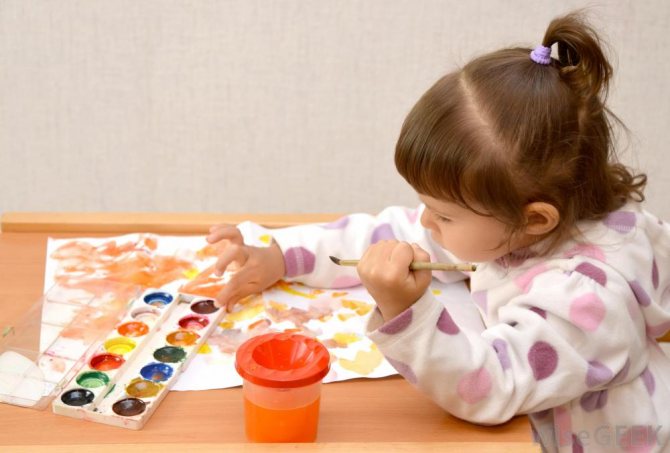
Features of speech development
The age period from 1 year to 3 years is the period most predisposing to the speech development of young children. When a baby just enters this age group, he uses only a few words like “dad,” “mom,” “grandfather,” “grandmother,” and so on. But he understands much more, in addition, he correlates specific words with the objects they mean. In order for the speech development of young children to go well, you need to constantly communicate with them, that is, constantly comment on your actions, show objects and name them, look at pictures and name all the objects that are depicted there, contact the child with basic requests.
By the age of 2, a child’s active vocabulary should contain about 40-50 words. It should be noted that the opinions of experts on this issue differ significantly. Therefore, you should not get attached to a specific number of words that a two-year-old baby should be able to pronounce. Everything is individual, there are cases that a young child’s speech develops a little later, and by the age of 2 he accumulates only a passive vocabulary. But if by the age of 2 the child does not speak at all and there are other neurological disorders, it is worth contacting a specialist and consulting on this issue.
A two-year-old baby does not pronounce all sounds correctly. Most often, children have problems with hissing, whistling and sonorant sounds. They either omit them in their speech or replace them. Both active and passive vocabulary continues to develop. Understanding of instructions improves significantly; at 2 years old, a child is able to complete two-syllable tasks, for example, “go to the kitchen and bring your plate.”
The vocabulary of a young child at 3 years old is about 1000 words. Many children speak well in sentences and use case forms, tenses and numbers. Speech at an early age of a child is a means of understanding the world. Parents should be prepared for numerous questions about everything that surrounds him.
If the child’s vocabulary is small and he cannot construct sentences, parents should contact a speech therapist and neurologist and independently stimulate the development of speech in a young child.
Agree with the child
The peculiarity of young children is that they already understand and realize everything. That is why it is possible to reach an agreement with them, but parents should understand that this does not mean forcing them to do what an adult needs; agreements must take into account the interests of both parties. Successfully reaching an agreement with your child means finding the optimal solution that will suit everyone.
To come to an agreement with a child, you need to learn to listen to him. It is important that the child understands that his condition is understood and all his wishes are taken into account, that he is listened to and heard. If a child comes with a problem, active listening will help him cope with negative feelings.
It is important to provide choices, to create the illusion of choice. Authoritarian orders will be met with hostility. The offer to make a choice will strengthen self-confidence and the understanding that his opinion is taken into account - conflict will not occur, and at the same time, the authority of the parents will not be shaken.
Causes of developmental delay
Child developmental delay is not an independent disease. This is a consequence of various reasons - both congenital and acquired, which affect the child from birth.
So, developmental delay can be caused by:
- Diseases of the mother during pregnancy: infections, injuries, poisoning, and so on.
- Oxygen deficiency in the fetus.
- Complicated, prolonged or rapid labor.
- Injuries that have affected the child's brain.
- Genetic abnormalities that affect the normal development of the child’s brain.
In addition to difficulties and diseases, mental retardation can be a consequence of improper upbringing of the child. According to statistics, this diagnosis is more often given to children from disadvantaged families, but this does not exclude the appearance of developmentally delayed children in ordinary families. Abuse, screaming, and scandals can cause a child to develop at a slower pace.
Early development: harm and benefit
The early development of preschool children means that parents, literally from birth, use all kinds of techniques in order to comprehensively develop their baby. Currently, many ways have been developed to educate a child, but how to understand what the baby needs and what areas need to be developed?
Today, many parents are committed to the early development of children, but the opinion of child psychologists on this issue is ambiguous. Early development has both positive and negative sides. The positive aspects of teaching young children is that variety is introduced into the child’s life. All techniques and ways of working with them arouse interest in most children.
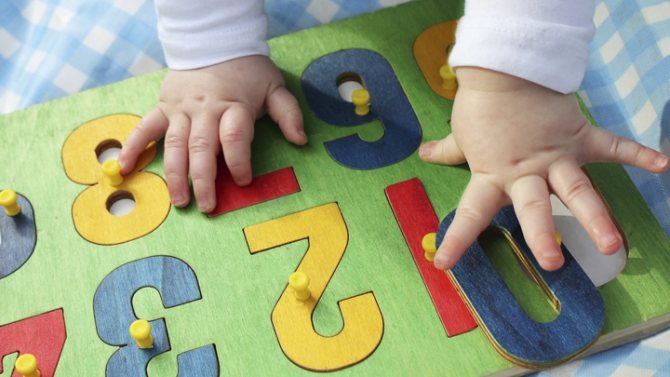
But there are also negative aspects of early development. According to neurologists, due to numerous activities that do not correspond to the age and level of development of the baby, the central nervous system is overloaded. Sometimes, due to such overload, the baby experiences functional underdevelopment of some parts of the brain, which leads to problems in learning and other activities in the future. In addition, parents of young children should not compare the successes and achievements of their child with the successes of others and force them to be equal to more successful children, as this can lead to persistent and serious problems with self-esteem.
It should be borne in mind that during the period up to 3-4 years, parts of the child’s brain are actively forming. Some early development methods are aimed at teaching counting and reading up to the age of 4 years. The cerebral cortex is responsible for these skills. Literally the following happens: the energy that is intended for the development of all departments is redirected only to the development of the cerebral cortex. As a result, in the future the child will have problems of a neurological nature; he will become impulsive, uncollected, and unable to cope with his own emotions.
The natural period of development of the cerebral cortex occurs at the age of 4 years; it is from this age that it is better to start teaching a child to count and read. Although in any case it is up to the parents to decide.
Of course, there are children who themselves show an interest in reading at an early age. In this case, such aspirations should be encouraged. This means that their brain is ready to receive such information. But you should never conduct classes for young children in a forced form.
Physical development
At an early age, a baby's weight is about a fifth of that of an adult, but much depends on the child's genetic predisposition and physical activity. And its activity is growing every year. As soon as a child begins to walk, new opportunities open up for him to explore surrounding objects, but this is a period of increased risk of injury, so parents should be very careful. It is recommended to remove all heavy, sharp, dangerous objects and household chemicals from his field of vision. All sockets must have plugs installed.
The figures of children of early preschool age are very peculiar: the back is arched, the stomach is slightly protruded due to internal organs that continue to grow. In children, folds on the legs and arms disappear, adipose tissue decreases, giving way to muscle tissue. The skeleton has not yet completely ossified, but the bones of the skull and spine have strengthened sufficiently.
Groups for early childhood development
For children from one to three years old, special early childhood groups are organized. They are aimed either at comprehensive development, or at the study of one specific area, for example, groups of artistic creativity, language, mathematics. Parents are present at classes with children; classes for young children are conducted in a playful manner in accordance with the methodology.
When choosing a program for a child, it is important that the classes do not overload or tire him. If he is capricious, refuses to study, or tries to run away, then they need to be stopped or replaced with others. It is necessary to take into account the individual characteristics of the child and select activities in accordance with his interests and strengths.

